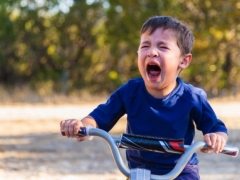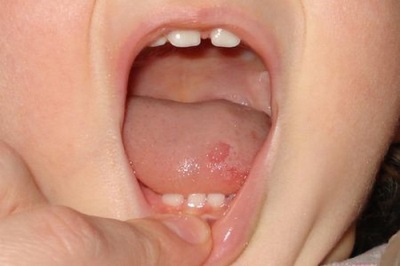What if the child bit his tongue to the blood?
Injuries in childhood are not uncommon, because the kids are active and inquisitive. Therefore, mothers should know how to provide first aid for various problems, for example, if a baby bit his tongue so hard that blood began to stand out from it.
The reasons
Most often, a child bites its tongue when it falls, for example, if it has slipped while running. A baby can hurt the tongue when learning to crawl or get up. Also, such injuries are possible with random blows to the face, for example, if a ball hit the child. You can bite your tongue when riding on a swing - when the swing soars very high, and then drop down sharply, the child's jaws can shrink, and the tongue falls between them.
Sometimes children bite their tongues while eating, when they bite off some product or actively chew it.
Trauma of the tongue is possible due to defects of the jaw or improper growth of the teeth. Another cause of biting the tongue to the blood is an epilepsy attack. If a child suffers from such a disease, it is important for parents to know how to act properly during an attack in order to prevent injuries to the tongue.
How to understand that baby bit his tongue
With such an injury, the child will complain of pain in the tongue, so the mother should consider the wound carefully.
To do this, use the light (if the damage did not occur during the day, then you can direct the light of the lamp or flashlight to the tongue) by asking your daughter or son to open his mouth and pull the tongue forward to the maximum. You will notice a fresh wound that is bleeding.
If the moment of the injury itself was lost sight of, a child’s complaints of pain during eating sour or hot foods may suggest a tongue injury. When viewed at the site of biting, hematoma or swelling may be detected.
How to help a child
A child can bite the tongue from any side - from above, and from the side, and from below. Especially severe bleeding is possible with lower injuries, because there are many blood vessels in it.
If the baby complains of pain in the tongue and you notice slight bleeding damage, you need to take the following measures:
- First of all, calm the baby, because most children are frightened by the sight of blood, and biting the tongue is often very painful.
- If the child bit his tongue while eating, rinse the mouth first and then put a tampon on the wound.
- You need to stop the blood with a swab of sterile bandage, folded in several layers. If the bandage is absent nearby, you can press the wound with a clean handkerchief.
- When biting the top of the tongue, the bandage is pressed against the sky.
- If the tongue is damaged from the side, the swab from the bandage is pressed against the gum, and when the tip is bitten, it is pressed against the teeth.
- If the child has bitten the tongue from below, the tampon should be put under the tongue, and with a finger or a spoon, press the tongue on top.
- The tampon should be replaced as needed with a clean one, keeping it in the mouth until the bleeding stops.
- Attaching ice or another cold object to the damaged tongue helps to stop the bleeding. Ice cube advised to wrap in a clean bandage.
- When the bleeding has stopped, the wound should be disinfected. To do this, optimal use of hydrogen peroxide, and the use of green or iodine is not recommended (such funds can burn the mucous membrane). It is acceptable to use methylene blue or chlorhexidine.
- In case of severe pain, you can use an anesthetic gel, which is used in babies with teething.You can also give paracetamol, given the age of the child when selecting the dosage.
- After biting the tongue, it is necessary to delay food intake for several hours, and sour and hot should be discarded for at least 5 hours, since such food will only increase the painful sensations.
When the tongue heals after being bitten, a whitish-gray patina will appear at the wound site. It is not necessary to remove it, because such a protective film will disappear on its own in a few days. To prevent complications after a tongue injury, the child should rinse his mouth with herbal decoction, for example, from chamomile, sage, oak bark, and St. John's wort. You can also attach to the site of damage cut leaf of aloe.
When to see a doctor
In some cases, after biting the tongue of the child should immediately be taken to the health facility:
- If the injury site is heavily swollen or a large bruise has formed on it.
- If within 20-30 minutes the bleeding from the bitten tongue does not stop.
- If the wound is very long (more than 0.5 cm long) or very deep, as well as with uneven bleeding edges.
- If bitten off part of the tongue (even if it is tiny).
- If the pain is very severe and the discomfort increases with time.
- If there is suppuration at the site of biting.
A child with a tongue bitten to the blood must be shown to a traumatologist, and if the wound is extensive and deep, the kid will be sent from traumatology to surgery.












